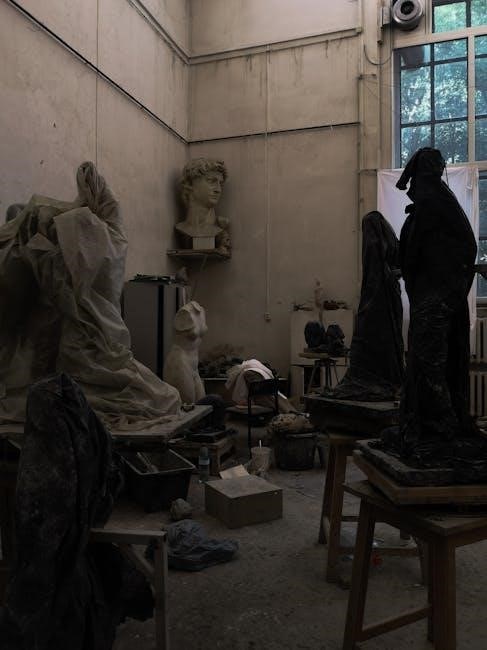Catholic teaching on manual stimulation is a sensitive and complex topic‚ rooted in theological perspectives on human sexuality. The Church emphasizes sexual acts as sacred‚ intended for procreation and unity within marriage. Moral principles‚ such as natural law‚ guide its stance‚ encouraging self-control and alignment with divine will.

What is Manual Stimulation?
Manual stimulation refers to the deliberate physical act of self-pleasuring‚ often associated with masturbation. It is discussed in contexts of moral theology‚ sexual ethics‚ and personal behavior guidance.
Definition and Context
Manual stimulation is defined as the intentional physical act of self-pleasuring‚ particularly genitalia‚ aimed at sexual arousal. In Catholic contexts‚ it is often linked to discussions on chastity and moral behavior. The Church views it through the lens of natural law‚ emphasizing that sexual acts should align with their procreative and unitive purposes. This definition is central to understanding the theological and ethical debates surrounding human sexuality within Catholic doctrine.
Contexts in Which Manual Stimulation is Discussed
Manual stimulation is primarily discussed within Catholic moral theology‚ particularly in relation to sexual ethics and chastity. It arises in conversations about human sexuality‚ marriage‚ and the purpose of sexual acts. The Church addresses it in the context of procreation and the unity of spouses‚ emphasizing that sexual behavior should align with divine intent. These discussions often occur in theological debates‚ pastoral counseling‚ and sacramental settings like confession‚ reflecting the Church’s broader teachings on self-control and moral living.

Catholic Moral Theology on Human Sexuality
Catholic moral theology views human sexuality as sacred‚ emphasizing its purpose within marriage for procreation and unity‚ guided by natural law and divine intent.
The Church’s Teaching on Sexual Acts
The Catholic Church teaches that sexual acts are sacred and intended for marriage‚ serving both procreation and the unity of spouses. Extramarital sexual activities are considered immoral. This perspective is deeply rooted in the Church’s moral theology‚ emphasizing the dignity and purpose of human sexuality as ordained by God. Sexual acts outside of marriage‚ including masturbation‚ are viewed as contrary to natural law and divine will‚ reflecting the Church’s emphasis on chastity and self-control.
The Principle of Natural Law in Catholic Teaching
The Catholic Church grounds its moral theology in the principle of natural law‚ which holds that certain moral truths are inherent in human nature and discernible through reason. Sexual acts‚ according to this principle‚ are intended by God for procreation and the unity of spouses within marriage. Any sexual activity outside this context‚ including manual stimulation‚ is seen as contrary to natural law and thus immoral. This principle emphasizes the moral purpose of human sexuality and guides the Church’s teachings on sexual morality.

Scriptural and Theological Foundations
Scripture and Catholic theology emphasize the dignity of human sexuality‚ created in God’s image. Sexual acts are viewed as sacred‚ intended for procreation and marital unity‚ reflecting divine design.
Biblical Teachings Relevant to Sexual Morality
Biblical teachings emphasize the sanctity of human sexuality‚ created in God’s image. Passages like Genesis 1:27 and Matthew 5:27-28 highlight the sacredness of sexual acts‚ reserving them for marriage. The Apostle Paul in 1 Corinthians 6:18-20 underscores the importance of self-control and purity‚ viewing the body as a temple of the Holy Spirit. These teachings form the basis of Catholic moral theology‚ guiding principles on sexual behavior as a reflection of divine design and human dignity.
Theological Explanations of Human Sexuality
Catholic theology views human sexuality as a divine gift‚ integral to God’s plan for humanity. It emphasizes the sacred purpose of sexual acts‚ which are meant to express love and foster life within marriage. The Church teaches that human sexuality reflects God’s will‚ calling individuals to uphold its sanctity through self-control and reverence. This theological framework underpins the Church’s moral teachings on sexual behavior‚ guiding Catholics to align their actions with divine design and the pursuit of holiness.

The Catholic Church’s Official Teachings
The Catholic Church provides clear moral guidance on human sexuality through official documents like the Catechism. These teachings emphasize the sacredness of sexual acts within marriage‚ aligning with divine intent and natural law.
What the Catechism Says About Sexual Behavior
The Catechism of the Catholic Church emphasizes that sexual acts are sacred and intended for procreation and unity within marriage. It teaches that sexual behavior must align with God’s design and natural law. The Catechism calls for chastity‚ self-control‚ and the avoidance of immoral acts. While it does not explicitly mention manual stimulation‚ it condemns any sexual act that is selfish‚ separates pleasure from its procreative purpose‚ or occurs outside the context of marital love. This teaching reflects the Church’s broader view of sexuality as a gift from God‚ meant to be expressed responsibly and morally.
Historical Development of Church Doctrine on Sexuality
The Catholic Church’s doctrine on sexuality has evolved over centuries‚ shaped by biblical teachings‚ patristic writings‚ and theological reflection. Early Church Fathers like Augustine emphasized the moral dimensions of sexual acts‚ while medieval theologians like Thomas Aquinas integrated Aristotelian philosophy into natural law principles. The Council of Trent and later Vatican II reaffirmed the sacredness of marriage and the procreative purpose of sexuality. Modern encyclicals‚ such as Humanae Vitae‚ have further clarified the Church’s stance‚ opposing artificial contraception and reaffirming the moral framework for sexual behavior. This historical development underscores the Church’s consistent emphasis on sexuality as a divine gift‚ intended for marital unity and procreation.

Masturbation in Catholic Teaching
The Catholic Church teaches that masturbation is immoral‚ viewing it as a misuse of sexuality contrary to natural law and divine intent. It emphasizes self-control and the sanctity of sexual acts within marriage.
The Church’s View on Masturbation
The Catholic Church firmly opposes masturbation‚ deeming it a moral disorder. It is seen as a form of self-indulgence that separates sexual pleasure from its intended purposes of procreation and marital unity. The Church teaches that masturbation violates the natural law‚ as it redirects sexual acts away from their divinely intended purpose. This stance is consistent with its broader teachings on human sexuality‚ which emphasize the sanctity and purposefulness of sexual behavior within the context of marriage and fidelity. The Church encourages individuals to practice self-control and seek spiritual guidance to overcome such temptations‚ aligning with its moral framework that prioritizes chastity and the proper use of human sexuality. By rejecting masturbation‚ the Church upholds its vision of sexuality as a sacred gift meant for deeper union and life-giving purposes. This teaching reflects the Church’s commitment to guiding believers toward a life of virtue and holiness‚ in accordance with its theological understanding of human nature and divine will. The Church’s opposition to masturbation is thus rooted in its comprehensive moral theology‚ which seeks to integrate faith‚ reason‚ and human experience in the pursuit of eternal salvation.
Why Masturbation is Considered Immoral
The Catholic Church views masturbation as immoral because it separates sexual pleasure from its divinely intended purposes of procreation and marital unity. It is seen as an act of self-indulgence that violates the natural law‚ which ordains that sexual acts must be open to life and expressive of love within marriage. Masturbation is considered a form of moral disorder‚ as it redirects sexual desire away from its rightful context‚ undermining the sanctity and purposefulness of human sexuality as taught by the Church. This teaching emphasizes the need for self-control and the orientation of sexual desires toward their natural and moral ends.

Church Documents and Encyclicals
Catholic teaching on sexuality is outlined in documents like the Catechism of the Catholic Church and encyclicals such as Humanae Vitae‚ which emphasize the moral purpose of sexual acts.
Key Documents Addressing Sexual Ethics
The Catechism of the Catholic Church and Pope Paul VI’s encyclical Humanae Vitae are central to understanding the Church’s stance on sexual ethics. These documents emphasize that sexual acts must align with natural law‚ serving procreation and marital unity. They condemn actions that separate sexuality from these purposes‚ including masturbation‚ as they are seen as contrary to God’s design. These teachings are reinforced by other Vatican documents‚ providing a consistent moral framework for Catholics to follow in their sexual lives.
The Role of Conscience in Sexual Decision-Making
In Catholic teaching‚ conscience plays a pivotal role in guiding individuals to make morally sound decisions‚ including those related to sexual ethics. Catholics are encouraged to form their consciences through prayer‚ reflection‚ and adherence to Church doctrine. While personal discernment is valued‚ it must align with the moral principles outlined by the Church. This ensures that decisions regarding sexuality are not merely subjective but rooted in divine law and the teachings of the Catholic faith.

Pastoral Advice and Guidance
How Priests and Counselors Advise on Sexual Issues
Priests and counselors guide individuals to align sexual behavior with Catholic moral teachings‚ emphasizing chastity and self-control. They encourage seeking forgiveness through confession and living virtuously.
Priests and counselors guide individuals to align sexual behavior with Catholic moral teachings‚ emphasizing chastity and self-control; They encourage seeking forgiveness through confession and living virtuously‚ while also fostering a deeper understanding of Church doctrine; Counselors may suggest prayer‚ reflection‚ and spiritual practices to help individuals manage temptations. The Church promotes seeking guidance from clergy or trusted advisors to navigate moral dilemmas‚ ensuring actions align with divine will and natural law.
The Sacrament of Confession and Sexual Sins
The Sacrament of Confession provides a pathway for Catholics to address sexual sins‚ including manual stimulation‚ by seeking forgiveness and reconciliation with God. The Church teaches that through confession‚ individuals acknowledge their sins‚ express contrition‚ and receive absolution. Priests guide penitents to understand the moral implications of their actions and encourage spiritual growth. The sacrament emphasizes the importance of seeking divine mercy and striving to live according to Catholic moral teachings‚ fostering a deeper commitment to chastity and virtue.

Cultural and Modern Perspectives
Modern society often views sexual behavior as a personal choice‚ emphasizing autonomy and individual freedom. This contrasts sharply with Catholic teachings‚ creating tension and dialogue.
How Modern Society Views Sexual Behavior
Modern society generally embraces sexual autonomy‚ viewing it as a personal choice rather than a moral issue. The rise of secularism and individualism has led to increased acceptance of various sexual practices‚ including manual stimulation‚ as a natural part of human sexuality. This perspective often conflicts with religious teachings‚ fostering debates about freedom versus tradition. The internet and media amplify these views‚ promoting open discussions and normalization of once-taboo topics.
Tension Between Catholic Teaching and Modern Values
A significant divide exists between Catholic doctrine and contemporary societal views on sexuality. While the Church emphasizes sexual acts as sacred and procreative‚ modern culture often prioritizes personal autonomy and sexual freedom. This tension is heightened by societal normalization of practices like manual stimulation‚ which the Church views as immoral. Modern values‚ influenced by secularism and individualism‚ increasingly clash with traditional religious teachings‚ creating challenges for individuals seeking to align their beliefs with evolving social norms and expectations.
Practical Advice for Catholics
Catholics are encouraged to seek guidance from clergy or counselors‚ fostering self-reflection and spiritual growth. Emphasizing prayer and sacraments helps align actions with Church teachings‚ promoting moral integrity and inner peace.
Living According to Catholic Teaching on Sexuality
Living in harmony with Catholic teaching on sexuality involves embracing chastity‚ self-discipline‚ and moderation in thoughts and actions. Catholics are encouraged to seek guidance from clergy‚ participate in sacraments like confession‚ and cultivate a deep prayer life. Education on Church teachings and open dialogue with spiritual advisors can foster a clearer understanding of moral principles. Engaging in community support groups and adhering to the Church’s guidelines on sexual behavior are also essential for maintaining a life aligned with Catholic values and promoting spiritual growth.
Seeking Support and Resources
Seeking support is crucial for aligning one’s life with Catholic teachings on sexuality. Catholics are encouraged to turn to spiritual directors‚ prayer groups‚ and confession for guidance. Educational resources‚ such as Church documents and reputable Catholic literature‚ provide clarity on moral teachings. Engaging in community activities and seeking advice from trusted advisors can foster a deeper understanding of faith and personal growth. Prayer‚ reflection‚ and sacramental life are essential tools for navigating challenges and living in accordance with Catholic values.
Catholic teaching on manual stimulation emphasizes the sacredness of human sexuality‚ aligning it with God’s design for marriage and procreation. The Church’s moral framework guides believers to understand sexual acts as expressions of love and commitment‚ rather than self-focused desires. By embracing prayer‚ sacraments‚ and community support‚ Catholics can navigate challenges and live in harmony with these teachings. This approach fosters a deeper understanding of faith and encourages individuals to seek holiness in all aspects of life‚ including their sexual morality.